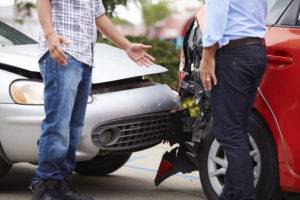The two types of required insurance in Florida are personal injury protection (PIP) and property damage liability (PDL) coverage as part of an auto insurance policy.
By law, Florida does not allow auto insurance claims to be filed against another driver. All drivers must go through their own policies to cover the costs of damage. That’s why its important that all drivers have personal injury protection (PIP) and property damage liability (PDL) coverage as part of their auto insurance policy. If coverage is insufficient to pay for all damages, a driver can file a lawsuit directly against the at-fault driver to recover the remainder.
Florida’s No-Fault Law
Florida’s no-fault law means drivers must turn to their own insurance policies to pay for damages after an accident. Every driver must carry personal injury protection (PIP) and property damage liability (PDL) coverage in the event they get into a car accident. Drivers are only required to carry the minimum policy on these types of coverage.
Need free legal help in Florida?
We specialize in personal injury claims.

Importance of Complying with Insurance Requirements
All drivers in Florida are required to comply with the state’s auto insurance requirements. There are penalties for not following those requirements. Drivers who don’t have PIP and PDL coverage can face fines of varying amounts, driver’s license suspension and reinstatement fees.
Overview of Florida’s No-Fault Law
It’s important to get an overview of Florida’s no-fault law. This includes the purpose and principles behind no-fault laws and a brief history of Florida’s adoption of the no-fault system.
The Purpose and Principles Behind No-Fault Laws
The point of no-fault laws is to use auto insurance to cover the costs of economic damages stemming from a car accident. Injured victims are also not obligated to prove someone was negligent if they have to claim compensation for medical expenses.
Brief History of Florida’s Adoption of No-Fault System
Florida originally passed bills to follow a no-fault system for car accidents in 1971. The law subsequently took effect in 1972 and allowed drivers injured in accidents to recover 100% compensation for medical expenses, 85% of lost wages and funeral expenses up to $1,000.
Required Insurance Coverage Under Florida’s No-Fault Law
In Florida, all drivers are required by law to carry personal injury protection (PIP) and property damage liability (PDL) coverage with their insurance policies. Drivers who fail to carry these mandatory forms of coverage can face penalties.
Need free legal help in Florida?
We specialize in personal injury claims.

Personal Injury Protection (PIP) Coverage
Personal injury protection (PIP) coverage is also considered no-fault insurance. Florida requires all drivers to carry this coverage as part of their policy.
Definition and Explanation of PIP Coverage
All drivers must carry PIP coverage in case they get into a car accident and sustain injuries. PIP pays for medical expenses, lost wages when an injury prevents the person from working and funeral expenses if someone is killed in an accident.
Any expenses that exceed the PIP limit must be paid out of pocket or through other forms of insurance such as health insurance.
Minimum PIP Coverage Limits Mandated By Law
Florida’s minimum PIP coverage limits are $10,000. This amount is mandated by law; if a driver does not include this coverage as part of their auto insurance policy, they face the risk of a license suspension and fines. Drivers who get into accidents and suffer damages without PIP coverage also have to pay all their damages out of pocket, which could be costly.
Benefits Covered Under PIP
Under PIP coverage, drivers can recover certain benefits. PIP pays for up to 80% of medical expenses up to $10,000 per person, lost wages, household and other essential services and funeral expenses up to $5,000.
Medical Expenses
PIP coverage is meant to pay for medical expenses when a person is injured in a car accident. It pays for up to 80% of medical expenses up to $10,000 per person. This coverage also pays for household and other essential services while you are unable to perform them yourself due to your injury.
Lost Wages
You can also recover benefits from PIP coverage to pay toward your lost wages. If you can’t work due to your injury, you can recover 60% of your lost wages up to $10,000.
Death Benefits
PIP also provides death benefits in the event that someone is killed in a car accident. It provides the family with up to $5,000 toward funeral expenses.
Property Damage Liability (PDL) Coverage
In addition to PIP, Florida’s insurance law requires all drivers to carry property damage liability (PDL) coverage. It’s important to understand the definition and explanation of PDL coverage.
Definition and Explanation of PDL Coverage
Property damage liability (PDL) coverage of up to $10,000 is required as part of every Florida driver’s auto insurance policy. It can be used to pay for damages after a car accident valuing up to $10,000 if that person is at fault for the incident. Although drivers are only required to carry up to $10,000 in PDL, it’s wise to pay for additional coverage.
Additional Coverage Options
You are allowed to add additional coverage to your auto insurance policy. This might include additional coverage that goes beyond the $10,000 minimum PDL. You cannot increase your PIP coverage beyond the $10,000 limit, but you can add MedPay. It can pay the remaining costs of any of your medical expenses that exceed your PIP coverage. This includes doctor’s appointments, hospital stays, ambulance fees, insurance co-pays or deductibles, surgery expenses, dental expenses, X-rays and other myriad expenses.
As part of your auto insurance policy, you can also add uninsured/underinsured motorist coverage and collision coverage.
Uninsured/Underinsured Motorist Coverage
Uninsured/underinsured motorist coverage added to your auto insurance policy protects you if you get into an accident with a driver who lacks insurance or has inadequate coverage to pay for damages if they are at fault. This is an optional add-on to your auto insurance that’s good to carry. It can also safeguard against a hit-and-run accident.
Collision Coverage
Another add-on you can get in your auto insurance policy is collision coverage. This helps to repair or replace your vehicle if it suffers damages in an accident with another vehicle or stationary object. Collision coverage is mandatory if you are leasing your vehicle. You can add it to your insurance if you own your car outright as well.
Key Takeaways
When it comes to Florida’s no-fault laws, there are key takeaways to remember. In Florida, drivers must carry both PIP and PDL insurance coverage to comply with no-fault requirements. PIP covers medical expenses, lost wages and death benefits for the policyholder. Finally, PDL covers damage that the policyholder causes to another person’s property.
In Florida, Drivers Must Carry Both PIP and PDL Insurance Coverage to Comply with No-Fault Requirements
If a driver fails to carry PIP and PDL coverage with their insurance policies, it means they have violated the no-fault law. In that situation, a driver faces certain penalties; this includes fines, license suspension and reinstatement fees.
PIP Covers Medical Expenses, Lost Wages and Death Benefits for the Policyholder
After a car accident that leaves you injured, you can turn to your PIP coverage to pay for your medical expenses and lost wages if you’re unable to work while recovering. If a person is killed after an accident, their surviving family members can recover death benefits up to $5,000 to pay for funeral expenses.
Frequently Asked Questions
What Are the Two Types of Insurance Coverage to Comply with Florida’s No-Fault Law?
The two types of insurance coverage all drivers need to comply with Florida’s no-fault law are personal injury protection (PIP) and property damage liability (PDL).
What Are the Names of the Two Florida Insurance Laws?
The names of the two Florida insurance laws are personal injury protection (PIP) and property damage liability (PDL).
What Is No-Fault Insurance Mandatory for in Florida?
Florida’s no-fault laws make it mandatory for all drivers to carry at least $10,000 in PIP coverage. This coverage is needed to pay for medical expenses after a car accident regardless of who’s at fault.
What Are the Two Basic Types of Coverage?
The two basic types of coverage in auto insurance policies are personal injury protection (PIP) and property damage liability (PDL).
What Are the Most Common Types of Insurance Policies?
The two most common types of auto insurance policies are liability coverage and uninsured/underinsured motorist coverage. Liability coverage includes bodily injury liability and property damage liability and pays for a person’s injuries if you’re at fault for an accident and damage to another person’s property, respectfully. Uninsured/underinsured motorist coverage protects you if you’re in an accident with a hit-and-run driver or a driver with insufficient insurance or none at all.
What Coverage Is Required for Car Insurance in Florida?
In Florida, personal injury protection (PIP) and property damage liability (PDL) coverage is required for car insurance. PIP pays for medical expenses, lost wages and funeral expenses. PDL pays for damage to another person’s vehicle when you are at fault for a car accident.
Can You Have Two Types of Insurance?
You can have two types of car insurance policies from two separate companies. However, you cannot get two policies for the same vehicle.
What Type of Insurance Is Required By Florida Law?
According to Florida Highway Safety and Motor Vehicles (FLHSM), all drivers are required to provide proof of PIP and PDL coverage as part of their auto insurance policy before registering a vehicle.
What Insurance Is Required By Law Florida?
Florida law requires drivers of cars or other vehicles with at least four wheels to have $10,000 in PIP coverage and $10,000 in PDL coverage with their auto insurance policies.
What Insurance Laws Apply to the State of Florida?
Because Florida is a no-fault state, its laws require drivers to carry PIP as part of their insurance coverage. This pays for injuries to you and anyone else in your vehicle if you are hurt in a motor vehicle accident regardless of who’s at fault.
What Type of Insurer Is Formed Under the Laws of Florida?
Under the laws of Florida, a domestic insurer is formed.
What Is Full Coverage Insurance in Florida?
Full coverage insurance in Florida comprises the $10,000 PIP and $10,000 PDL limits for all drivers’ auto insurance policies. Those who fail to carry one or both are not considered to have full coverage auto insurance.
Who Pays for Car Damage in Florida No-Fault?
Under Florida’s no-fault law, all drivers must use their auto insurance to pay for any vehicle damages. If the costs of repairs exceed the limits, however, drivers can get the remainder of their compensation from other sources; for example, they might have to file a lawsuit directly against the at-fault driver.
What Is the Minimum Car Insurance Required in Florida?
The minimum car insurance required in Florida includes $10,000 in PIP and $10,000 in PDL coverage.
Does PDL Insurance Cover Repairs to Your Car if You Were at Fault?
PDL insurance does not cover repairs to your car if you are at fault for an accident. It’s only meant to pay for another person’s vehicle or other property.
What Does it Mean That Florida’s Texting While Driving Law?
Florida’s texting while driving law means that police can pull over a driver and issue them a citation for texting while driving even if the person committed no other traffic violations.
Is Bodily Injury Required in Florida?
Florida does not require bodily injury coverage as part of your auto insurance policy. This is because PIP is often enough to pay for medical expenses and other relevant costs.
Need free legal help in Florida?
We specialize in personal injury claims.






